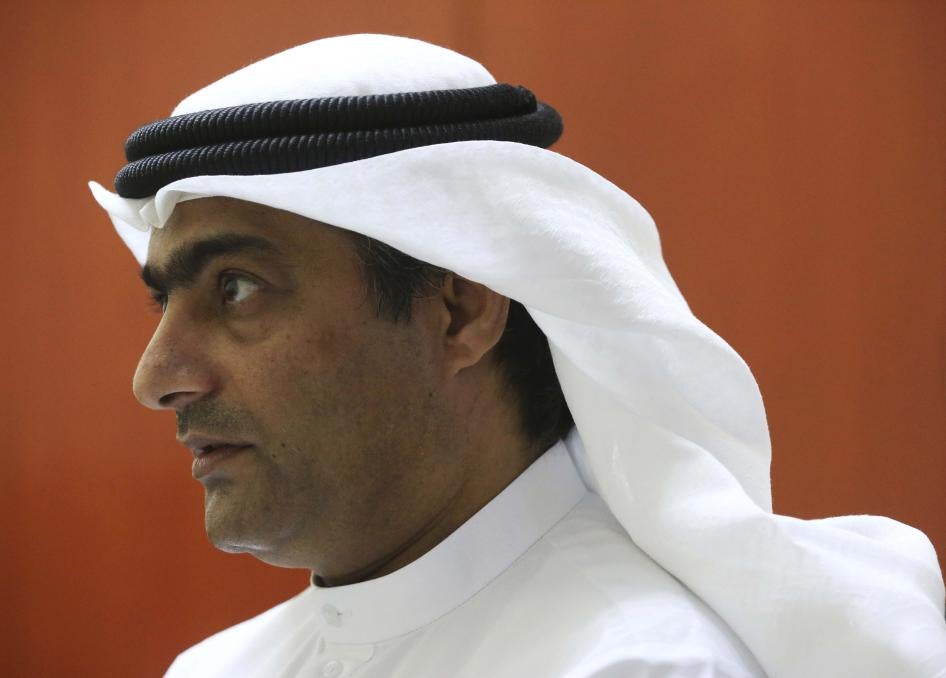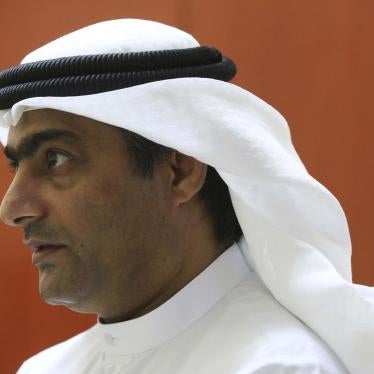(Beirut) – Emirati authorities have brought new charges against 87 defendants under its counterterrorism law in retaliation for forming an independent advocacy group in 2010, Human Rights Watch said today.
Those recently charged include prominent activists and dissidents already serving prison sentences, including human rights defender Ahmed Mansoor, as well as those convicted following the grossly unfair “UAE94” mass trial in 2013, many of whom are nearing the end of their sentences or have been held in detention arbitrarily after their sentences ended. According to the Emirates Detainees Advocacy Center (EDAC), authorities charged 43 of the men with establishing a “terrorist organization” and 44 with supporting and funding a “terrorist organization,” charges that carry sentences of up to life imprisonment or the death penalty.
“The UAE has ramped up its assault on rights and freedoms despite calls to uphold its human rights obligations around the COP28 climate conference,” said Michael Page, deputy Middle East and North Africa director at Human Rights Watch. “Leveling new charges based on peaceful advocacy over a decade ago seems nothing more than a shameless pretext to keep these men behind bars.”
EDAC told Human Rights Watch that the first hearing took place on December 7, 2023, at the Abu Dhabi Federal Appeals Court on charges that relate to the activists’ establishment of the Justice and Dignity Committee in 2010 to demand freedoms in the UAE. The defendants attended the hearing after at least five months in incommunicado solitary confinement, family members of four defendants told Human Rights Watch.
Among the 87 defendants recently charged are some who were convicted in July 2013 in the UAE94 trial. That trial resulted in convictions of 69 critics of the government, including eight in absentia, on charges that violated their rights to free expression, association, and assembly. At least 51 of the UAE94 prisoners are being held beyond the completion of their sentences. At least one of the UAE94 detainees who is facing new charges was already convicted for his involvement with the Justice and Dignity Committee, raising concerns that UAE authorities are violating the principle of double jeopardy, which prohibits trying people twice for the same offense after they had received a final verdict.
One defendant in the new case is Khalaf Abdul Rahman al-Romaithi, who was extradited from Jordan in May under exceptional circumstances that circumvented Jordan’s normal extradition procedures. An informed source confirmed to Human Rights Watch that al-Romaithi is facing terrorism charges related to the Justice and Dignity Committee. He had already been sentenced in absentia to 15 years in prison as part of the UAE94 case.
Members of three detainees’ families told Human Rights Watch that they were not informed of the new charges or the trial ahead of time, but only heard about it after the first hearing either from the defendants themselves or the EDAC.
Two of the accused prisoners were able to call their families in the UAE one week before the first hearing, inform them of the new charges, and ask for a lawyer, two of their family members said. One of the people whom Human Rights Watch spoke to said that their detained family member asked if the family had received any official notice or seen media reports about any new charges, but they had not.
“My father called my mother on December 1 and told her that he will not be able to attend my brother’s wedding because he will not be released soon,” he said. “We always told him that my brother will have his wedding when he is released, but now with this new trial he will not be there.”
Informed sources and family members of detainees said that in addition to being held for months in solitary confinement, they had been forced to sign documents confessing to committing “terrorist acts.”
According to an informed source, the names of defendants read out during the first hearing included Ahmed Mansoor, Nasser bin Ghaith, Salem al-Shehi, Mohammed Abdul Razzaq, Mohammed al-Sidiq, Khalifa al-Nuaimi, Mansoor al-Ahmad, Hasan al-Doqqi, Hasan al-Jaberi, Hussein al-Jaberi, Abdulsalam Darwish al-Marzouqi, Fouad al-Hamaadi, and an exiled dissident, Hamad al-Shamsi.
Mansoor and bin Ghaith have been charged with supporting the committee, designated by UAE authorities as a terrorist organization, said a source with knowledge of the matter.
Human Rights Watch has reported extensively on the persecution of Mansoor, the 2015 recipient of the prestigious Martin Ennals Award for Human Rights Defenders and member of the advisory boards of the Human Rights Watch Middle East and North Africa division and the Gulf Centre for Human Rights.
All the charges on which Mansoor was arrested and convicted in 2017 were based solely on his human rights advocacy, including digital communication with Human Rights Watch, Amnesty International, and other rights organizations. After he spent more than a year in solitary pre-trial detention and a grossly unfair trial, the UAE’s state security court sentenced him in 2018 to 10 years in prison and a fine of 1,000,000 Emirati dirhams (around US$272,000).
“Instead of using COP28 as an opportunity to release unjustly imprisoned dissidents and activists, some well after their sentences had ended, the Emirati government decided to double down on trampling their rights and keep them in prison by hook or by crook,” Page said.









